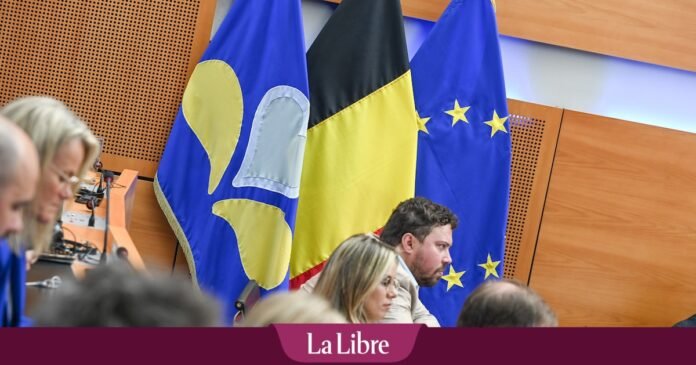French-speaking and Dutch-speaking MEPs must each find a majority in their linguistic role before joining forces to form the Brussels government.
But while an MR-PS-Engagés axis has emerged on the French-speaking side, the Dutch-speakers remain powerless to find a majority.
The blockage is such that Brussels negotiators discreetly consulted a law firm to “to investigate how to break the current deadlock“.
A favorable wind brought this company to conclusions The Free.
In this 16-page analysis, sent on September 7, it is about “an alternative path” which allows, on an institutional level to consider a minority government in Brussels on the Dutch-speaking side.
This idea, which has gained traction in certain parties in recent weeks, has so far run into a pitfall: the installation of the Brussels government requires a majority in the two language groups during the vote of confidence.
However, the Dutch-speaking opposition parties have no reason to put their trust in a minority political axis.
“The individual responsibility of French-speaking ministers”
However, the path that the law firm mentions allows us to do so dribble this difficulty via the implementation of the procedure known as “individual responsibility of ministers”.
In fact, Parliament cannot currently collectively overthrow the current government or replace it. Because the constructive no-confidence motion must be adopted”to the majority of the members of the Norwegian Parliament as well as to the majority of the members of each language group.“However, the Dutch language group does not have a majority.
On the other hand”nothing prohibits voting for an individual no-confidence motion against the current Prime Minister (Rudi Vervoort), as it is passed by the majority of MPs.
“They caught me”: faced with Elke Van den Brandt’s lack of progress in Brussels negotiations, the risky electoral coup of MR, PS and Engagés
Likewise, nothing prohibits voting on motions of individual censure against the other two current French-speaking ministers in the government (Alain Maron, Écolo and Bernard Clerfayt, Défi) or against the secretaries of state (Nawal Ben Hamou, PS and Barbara Trachte, Ecolo ), must this proposal is adopted by a majority of the members of the French language group.
But how do you appoint the new members of the MR-PS Engaged government?
A priori, candidates for the Brussels government are elected if they are presented on the same list signed by a majority of Brussels deputies, but also a majority in each language group.
If such a list is not submitted and no agreement is reached within 15 days, the Prime Minister and the other members of the government can be elected individually and in separate votes with an absolute majority among the members of the Folketing and with the support of the linguistic group to which they belong.
In other words, David Leisterh and the other French-speaking ministers could be appointed to the Brussels government, on the French-speaking side, even if the Dutch-speaking ministers and state secretaries did not obtain a majority, on their side. And the current Dutch-speaking ministers (from the Groen, Vooruit and Open VLD groups) would then remain in place.
We would end up with a Brussels government with a majority on the French-speaking side (MR, PS and Engagés, with an absolute majority in the Brussels Parliament), but a minority on the Dutch-speaking side (Groen, Open VLD and Vooruit , i.e. only 8 seats out of 16).
“Logicalwrites the law firm, if it be admitted that the present Government has the full extent of its powers, the same will be all the more true of this newly constituted Government.” However, “lThe situation would undoubtedly be different if the Dutch-speaking members resigned in turn and individually.
In this scenario, the State Council will “would run the risk of considering that this government no longer has the opportunity to validly deliberate, and that it must limit its action to the handling of current affairs.” we can still read in this hearing.
This government’s powers will also be limited, as it will not be able to vote on texts relating to Community affairs, which, although few in number, require a double majority.
Immerse yourself in the disturbing underground landscape of Brussels
A track that is considered too adventurous
“To be complete, it is necessary to assess the jurisdictional risks of the operation, it being understood that the Council of State would be the natural judge, although we cannot completely rule out a possible debate in a court of law.”writes the company again, which concludes by assessing that “the proposed formula, with the relative risks it entails, is the only one that makes it possible to avoid a stagnation of the crisis and a solution to it, limited to the appointment of the French-speaking members of the government.
Will this approach be implemented?
According to our information, this is not on the agenda. Coach David Leisterh, we are told from good sources, considers it too constitutionally adventurous.
Even in the case of an endless block? In Brussels politics, you can’t swear about anything…
